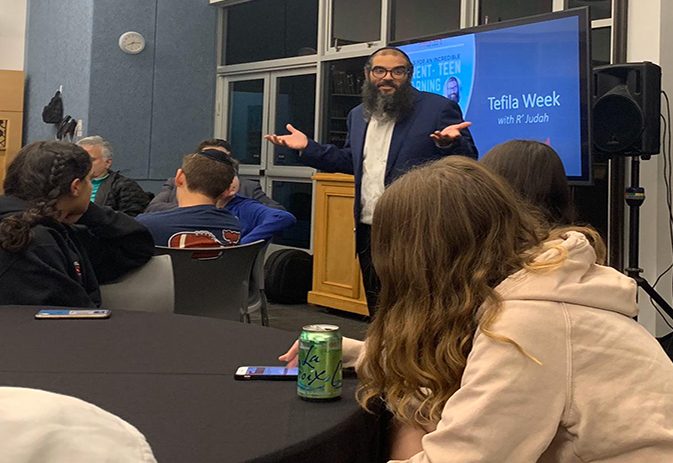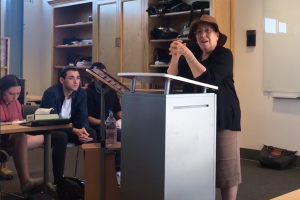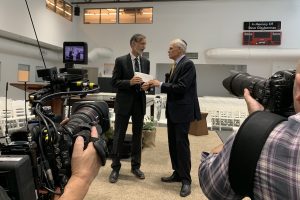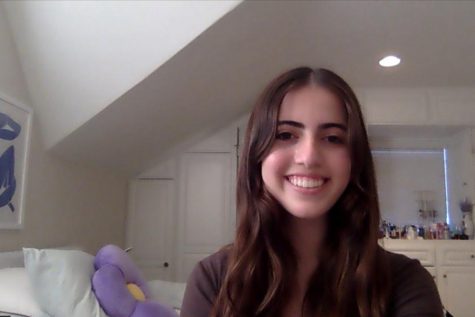Visit from Rav Judah sheds a Hasidic light on prayer
At a parent-teen learning session on Oct. 29, Rav Judah taught about the meaning of tefillah (prayer) and how to incorporate it into their day-to-day lives.
January 5, 2020
When Rabbi Judah Mischel made his annual visit this year, students once again engaged with a Hasidic perspective that they don’t always encounter in their regular Judaic Studies program.
Rabbi Mischel, known simply as “Rav Judah,” says he tries to embody Hasidism personally while teaching it in many different ways.
“I think that it’s what I desire for myself and my own family — to really believe in what we’re doing,” Rav Judah said in an interview, “to really cultivate a sense that Hashem is interested in us, that God believes in what we’re doing and that everything that’s happening to us in life is meaningful and important.”
“If I’m trying to transmit that in my teaching, it’s because I’m trying to live with that myself,” he said.
No one knows exactly how long Rabbi Mischel has been coming to Shalhevet. He has been a Scholar-in-Residence each year since 2014, and before that he sometimes visited when in Los Angeles for other teachings.
This year, Shalhevet’s administration asked Rav Judah to teach about tefillah — prayer. Over a period of four days, he taught two sessions in each grade, guided a parent-teen learning session on Oct. 29, and met with groups of students about incorporating prayer into their everyday lives.
The topic was a natural fit for a Hasidic outlook.
“Tefillah is something that every human being is engaged in and working on and struggling with, it’s the creation of the world,” Rav Judah said.
“King David — David Hamelech — described prayers [as] ve’ani tefillah” — meaning, I am prayer, he said. “The goal of tefillah is recognizing that our entire life, that we ourselves, are prayer. There’s nothing that more encapsulates and expresses the goal of our lives than living prayerfully.”
Hasidic thought, also known as Hasidut, began as a search for meaning among Polish Jews in the 18th century. It emphasizes the need for the Jewish people to love one another, as well as the importance of developing a relationship with God, as opposed to simply following the Torah as a rigid code of law.
According to Rabbi David Block, head of Judaic Studies and Associate Head of School, Rav Judah explores ideas that the school’s curriculum does not always teach, even though it fits into the school’s philosophy.
“We don’t always get an opportunity to explore Hasidic thought, and all of the other pieces of Torah that he brings, and that’s simply a function of our curriculum,” Rabbi Block said. “But I think it’s also really important to be exposed to different ways of thinking, of learning, and I think he brings that.”
Rabbi Block, who along with Rabbi Yagil Tsaidi chose the topic of tefillah for Rav Judah’s teaching this year, said tefillah is something Shalhevet’s faculty is constantly trying to improve.
“Many people at some point struggle with tefillah and it’s hard,” Rabbi Block said. “This is not just a Shalhevet issue. This is a community issue. How do you make tefillah more meaningful and engaging? So we thought Rav Judah is someone who both has unbelievable Torah on this and is a deeply spiritual person, but has also probably struggled with this himself.”
Rav Judah said that as a child, he did not feel the same connection towards Judaism that he does today. He said he was raised in a “proud Jewish home,” with parents who did not have any formal Jewish education. However, his parents made sure that he received a strong Jewish education.
“I didn’t always find meaning in observance,” Rav Judah said. “I certainly didn’t find meaning in all of the traditions but always identified with the cultures and symbols of Judaism.”
He said his years of teaching experience have shown him that students all experience the same struggles.
“The hardest thing for U.S. high school students is probably the hardest things for high school students in general, for teenagers in general, and for most people,” said Rav Judah. “To really know that we have a unique role to play in the world, to believe in ourselves, to know that our efforts in Yiddishkeit matter.”
Most of the year Rav Judah lives in Israel. But during summers, Rav Judah works as the Executive Director of the Hebrew Academy for Special Children, also known as Camp HASC, a Jewish summer camp in New York for boys and girls with special needs.
Head of School Rabbi Ari Segal said Rav Judah brings something unique to everyone he encounters.
“Rav Judah is really a one-of-a-kind human being and I have loved what he has brought to our school – in his work with students, parents and faculty,” Rabbi Segal said.
Except for his summers at Camp HASC, Rav Judah lives most of the year in Ramat Beit Shemesh, Israel, with his wife, Ora, and their eight children.
He also has served as a member of the Judaic Studies staff at the Frisch School in Paramus, N.J. After making aliyah, Rav Judah taught at Yeshivat Reishit in Beit Shemesh for 10 years. He is also the founder of an organization devoted to inspiring and connecting Jews with each other, called of Tzama Nafshi.
After so many visits, students have come to expect a certain style and mood from Rav Judah’s lessons. Junior Sophie Handelman says that his shiurs have had a lasting impact on her.
“He taught us about knowing your worth and having confidence in yourself, and it really made me think about it in a different way,” said Sophie. “I was thinking about it for a while after.”
Freshman Avi Litvak says Rav Judah’s discussions are interactive.
“I really enjoyed how he discussed the Torah with us and asked everyone individual questions,” said Avi. “He made sure that everyone was part of the conversation.”
Sophomore Jessica Melamed wished he’d spoken about more topics.
“The school should’ve had him talk about multiple topics, not just tefillah, because I felt that it just got really redundant,” said Jessica. “I saw him four times and he spoke about tefillah all four times,” she said.
Rav Judah said he appreciates the feedback he gets from students at Shalhevet.
“It’s rare to find a community that’s so dynamic and open where there’s just a little challenge, fact-checking, a little push back, in a respectful way as part of a search for truth together,” he said.
He describes himself as “a Jew who’s really trying to try his best, to be a good person, to live life to the fullest, to reveal Hashem in the world.”
“I don’t always feel this close but I always want to feel close,” he said. “There is no such thing as a Jew who’s far. Our Yiddishkeit is what we are, it’s not just what we do.”
















